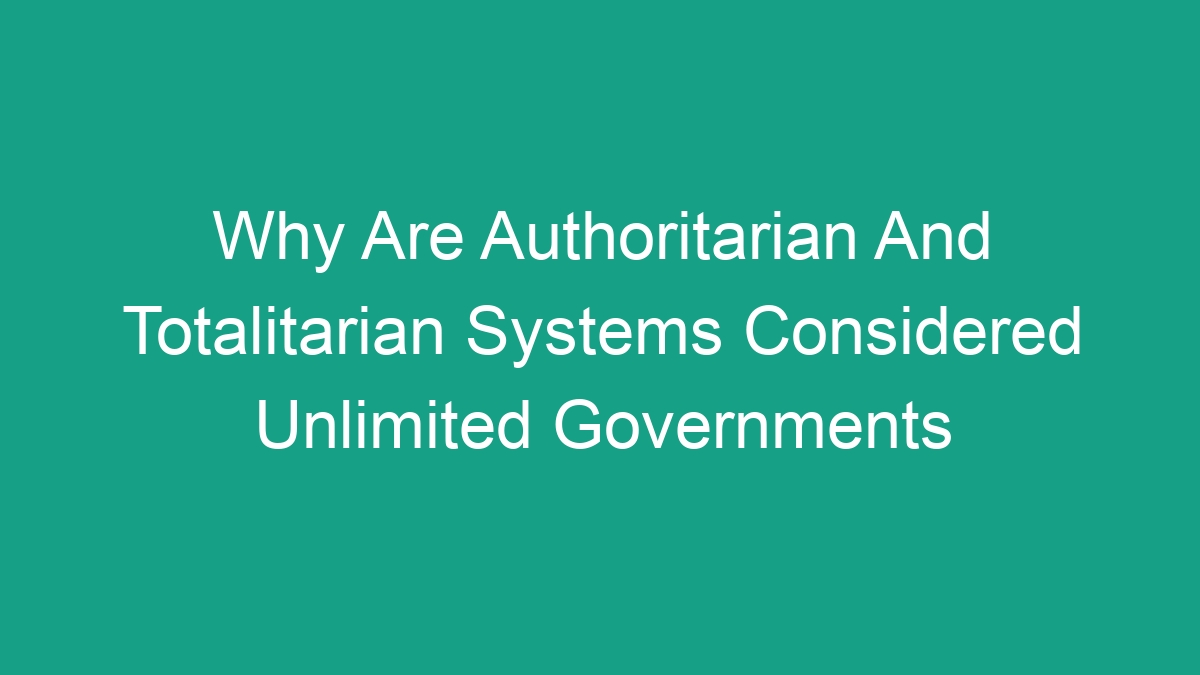
Understanding Authoritarian and Totalitarian Systems
In the realm of political science and governance, it is crucial to understand the different types of governments that exist. Authoritarian and totalitarian systems are often viewed as unlimited governments due to their unchecked power and control over citizens. These systems are characterized by an absence of democratic processes, human rights violations, and a lack of political and individual freedoms. Understanding the key characteristics and implications of these systems is essential in recognizing why they are considered unlimited governments.
Authoritarian Systems: The Power of the Few
Authoritarian systems are characterized by a concentration of power in the hands of a select few individuals or a single leader. This form of government often lacks constitutional limitations on the exercise of power, and there are limited checks and balances in place. In many authoritarian systems, the ruling party or individual holds absolute power over the legislative, executive, and judicial branches, allowing them to make unilateral decisions without accountability.
The lack of political pluralism and freedom of speech in authoritarian systems enables the ruling party or leader to maintain control and suppress dissenting voices. Opposition parties, independent media, and civil society organizations are often restricted or suppressed, further consolidating the power of the ruling elite. The absence of democratic processes and limited political freedoms in authoritarian systems contribute to the unchecked power of the ruling party or leader.
Totalitarian Systems: The Total Control
Totalitarian systems take the concept of unlimited government to the extreme, where the state seeks to control every aspect of public and private life. In totalitarian regimes, the government exercises complete and total control over all societal institutions, including the economy, education, media, and even personal beliefs and values. The ruling party or leader attempts to shape the thoughts and behaviors of citizens through propaganda, censorship, and state-sponsored ideology.
Individual freedoms and human rights are severely restricted in totalitarian systems, with dissent often met with severe punishment or even death. Citizens are expected to conform to the ideals and policies imposed by the ruling regime, and any form of opposition is swiftly quashed. Totalitarian systems are characterized by a cult of personality around the ruling leader, with the state glorifying and promoting their image as the embodiment of the nation. The pervasive control and manipulation of all aspects of society in totalitarian systems contribute to their classification as unlimited governments.
Why Are Authoritarian and Totalitarian Systems Considered Unlimited Governments?
Authoritarian and totalitarian systems are considered unlimited governments due to their consolidation of power, lack of political freedoms, and absence of checks and balances. In these systems, the ruling party or leader has the authority to make decisions without accountability, with little to no opposition or dissent allowed. There are several key reasons why these systems are classified as unlimited governments:
1. Concentration of Power
In both authoritarian and totalitarian systems, power is concentrated in the hands of a select few individuals or a single leader. The ruling party or leader holds significant influence over all branches of government, enabling them to make unilateral decisions without the need for approval or oversight. This concentration of power allows for unrestrained authority and control, contributing to the classification of these systems as unlimited governments.
2. Lack of Political Freedoms
In authoritarian and totalitarian systems, political freedoms such as the right to assemble, freedom of speech, and the ability to participate in free and fair elections are severely restricted. Opposition parties, independent media, and civil society organizations are often suppressed or restricted, limiting the ability of citizens to engage in genuine political activity. Without these fundamental freedoms, the ruling party or leader can maintain power without facing legitimate challenges, leading to the classification of these systems as unlimited governments.
3. Absence of Checks and Balances
The absence of institutional checks and balances in authoritarian and totalitarian systems allows for the unchecked exercise of power by the ruling regime. Without mechanisms to hold leaders accountable or limit their authority, there is little to prevent the abuse of power and the violation of citizen rights. This lack of accountability contributes to the classification of these systems as unlimited governments, as there are few if any mechanisms to restrain the actions of the ruling party or leader.
The Implications of Unlimited Governments
The classification of authoritarian and totalitarian systems as unlimited governments has significant implications for citizens and the international community. These implications include:
1. Human Rights Violations
Unlimited governments often engage in systematic human rights violations, including the suppression of free speech, political persecution, and the use of force against dissenting voices. Citizens in these systems are at risk of arbitrary detention, torture, and even extrajudicial killings, leading to widespread human rights abuses.
2. Lack of Accountability
Without institutional checks and balances, leaders in unlimited governments are able to act with impunity, making decisions that may benefit themselves or their inner circle rather than the broader population. This lack of accountability can lead to corruption, economic mismanagement, and the unequal distribution of resources.
3. Global Stability and Security
The presence of unlimited governments can pose a threat to global stability and security, as these systems often engage in aggressive or expansionist behavior. The pursuit of power and control by authoritarian and totalitarian regimes can lead to regional conflicts and geopolitical tensions, impacting the broader international community.
Conclusion
Authoritarian and totalitarian systems are considered unlimited governments due to their consolidation of power, lack of political freedoms, and absence of checks and balances. These systems have significant implications for citizens and the international community, contributing to the need for continued attention and engagement in addressing human rights violations and promoting democratic governance. Recognizing the characteristics and consequences of unlimited governments is essential in advocating for the protection of fundamental rights and freedoms for all individuals.



